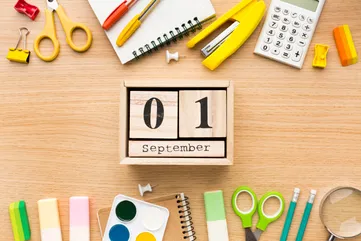Prioritization
Prioritization is the ability to determine the relative importance and urgency of tasks, allocating time and energy to what truly matters rather than what's loudest or easiest.
Why teens struggle with priorities
Everything feels equally urgent to the teenage brain. Without developed judgment, they can't distinguish important from immediate.
Prioritization challenges:
• Doing fun homework first, leaving hard subjects for exhausted brain
• Spending hours perfecting low-value assignments
• Prioritizing social media over sleep
• Focusing on urgent but unimportant tasks
• Unable to identify what actually matters
• Treating all assignments as equal weight
This leads to exhaustion from minor tasks while major responsibilities remain undone.
You're not alone
If your teen spends three hours on poster decoration while ignoring the essay worth 30% of their grade, they're showing typical adolescent prioritization challenges. The prefrontal cortex responsible for weighing importance doesn't fully develop until age 25. Most teens need explicit teaching about how to evaluate and rank priorities. This skill dramatically improves with practice and support.
What it looks like day to day
Student
Your teen meticulously organizes their notes for an easy class while failing to study for the crucial math test tomorrow.
Parent
You watch your teen stress about minor friend drama while college application deadlines loom ignored.
Tiny steps to try
- 1
ABC ranking
Label tasks A (must do today), B (should do soon), C (nice if time). Focus only on As first.
- 2
Impact questions
Ask "What happens if this doesn't get done?" Helps identify true priorities versus perceived urgencies.
- 3
Grade weight awareness
Post assignment weights visibly. 30% essay matters more than 5% homework completion.
- 4
Energy matching
Do hardest tasks during peak energy. Don't waste prime brain time on easy tasks.
- 5
Weekly big rocks
Identify three most important things for the week. Everything else is sand filling gaps around rocks.
Why prioritization determines success
Life constantly demands more than time allows. Prioritization is the difference between achievement and constant overwhelm.
Students with strong prioritization skills report lower stress, higher grades, and better life satisfaction. This skill becomes increasingly crucial in college and careers where external structure decreases.
Ready to help your teen thrive?
Get personalized 1-on-1 coaching to build better habits and boost grades. Join 10,000+ families who trust Coachbit.
Frequently Asked Questions
How do I help without imposing my priorities?
Guide thinking rather than dictating priorities. Ask questions: "Which assignment affects your grade most?" "What are consequences of not doing this?" Help them develop criteria for importance. Your role is teaching the thinking process, not deciding their priorities. Exception: safety and health are non-negotiable priorities.
My teen prioritizes everything except schoolwork. Help?
Understand what they're actually prioritizing. Often it's social connection, autonomy, or stress relief. These are valid needs. Help them find ways to meet these needs while also handling responsibilities. Create "both/and" solutions rather than "either/or" battles. Link academic tasks to their actual priorities when possible.
Related Terms
Executive Function
Executive function is your brain's management system that helps teens plan, focus, remember instructions, and juggle multiple tasks successfully.
Goal Setting
Goal setting is the process of identifying specific, achievable objectives and creating actionable plans to reach them within defined timeframes.
Planning
Planning is the ability to create structured approaches for achieving goals by breaking them into steps, estimating time, and sequencing actions effectively.
Time Management
Time management is the ability to plan, prioritize, and use time effectively to accomplish tasks and meet deadlines without constant crisis.
Related Articles

3 Tips to Help Your Child Focus on Homework
Kids struggle to focus and are easily distracted because their brains are undergoing rapid development. There are effective tools to improve concentration and focus in kids.
Read article
Finding Order in the Chaos – Setting up Calendars for Kids
Creating a calendar and daily schedule for kids can be beneficial to manage school, homework, extracurriculars and hobbies. Color-coding and time-blocking are helpful tools for kids with ADHD.
Read article
